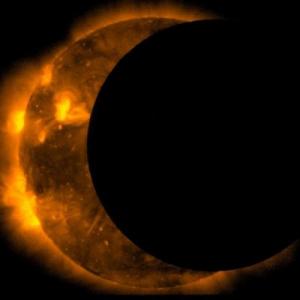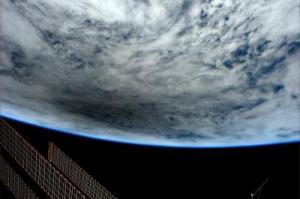On science blogs this week: Eclipsing
PRIMUM NON NOCERE, BUT NOT IN THE CASE OF PROSTATE CANCER. It's now official: Screening for prostate cancer via the prostate-specific antigen (PSA) test causes more harm than good, according to the final recommendation from the United States Preventive Services Task Force (USPSTF). At the Health Care Blog, Merrill Goozner explains the problems succinctly. Eighty per cent of "positive" PSA tests are false positives, but quite often they lead to useless and harmful treatment. Goozner says:
[F]or every man whose death from prostate cancer is prevented through PSA screening, 40 become impotent or suffer incontinence problems, two have heart attacks and one a blood clot.
So now that we have both data and authoritative declarations, PSA screening will cease forthwith, right?
Silly question. PSA screening will of course continue, full speed ahead. There's money to be made here, folks. And not only that: the word "cancer" unhinges people, damages their ability to hear facts that contradict their beliefs. Commenting on the PSA advice, Otis Brawley, chief medical officer of the American Cancer Society, told NPR that people will continue to be unscientific, and docs will continue to practice faith-based medicine, reports Scott Hensley at the NPR blog Shots. In a different post, Hensley explains a Johns Hopkins study exploring why docs and their patients will continue to stick their fingers in their ears and chant "La La La, can't hear you!":
Nearly three-quarters of the respondents said patients expected regular PSA screening to continue. Two-thirds said, essentially, it would take too much time to explain. And about half cited malpractice concerns.
Two out of 3 docs said it would take too much time to explain. That's pretty chilling. Too much of the doc's time, they mean. Nothing about using up the time (and money!) of the man who suffers through the pain and fear of useless surgery and iatrogenic incontinence and the end of his sex life, and who would have died much later of something other than prostate cancer.
Some docs applaud the statement against PSA testing, like Marc Garnick, who gave details of the clinical trials that showed no difference in prostate cancer death rates between men who had been screened and those who hadn't. Garnick writes at the Harvard Health Blog:
All trials have flaws, and advocates of PSA screening say that these flaws undermine the USPSTF recommendation. Had these flaws not been present, they say, the results would have supported the benefits of screening. This charge has not been borne out.
According to a doc interviewed by Eryn Brown at the LA Times's Booster Shots, people think of cancer as an infection to be expunged. The real problem is not the PSA test, but the rush to treatment, say docs interviewed by Rosie Mestel at Booster Shots.
We saw the same factors at work with breast cancer a few years ago when experts issued their expert opinion that there should be fewer mammograms.
ONCE MORE, TELEPORTATION. Was it only last week we learned that Chinese scientists had broken the long-distance record for teleportation? It was indeed. And here we are again, only this time it is European scientists setting a new record for teleportation of quantum information: nearly 150km, from one Canary Island to another. Explications from KFC at the Physics arXiv Blog and also Hamish Johnston at Physicsworld.com.
And was it only last week that I thought I was kidding when I speculated that "Beam me up, Scotty" was just a matter of time? Little did I know. Because it turns out the next teleportation goal is to transfer quantum information from Earth to an orbiting satellite. The European scientists say this may actually be easier than Canary Island-hopping because beaming something straight up, Scotty-style, will bypass a lot of interference from terrestrial weather.
CLIMATE CHANGE ECLIPSES THE HEARTLAND INSTITUTE. The International Conference on Climate Change — the just-concluded annual denialist festival put on by the now-notorious Heartland Institute — will be no more, at least until the big bucks start rolling in again. Stephen Lacey reported on how donors have fled from Heartland's stupid ad tricks and and summarized the conference at Climate Progress.
At Grist, Lacey switched to comic relief, reporting how Lord Monckton cracked up the conference crowd by displaying a faux Hawaiian birth certificate and announcing plans to run for US President. I take it as a good sign that climate deniers feel they must beef up their numbers by embracing sundry other nutjob causes.
But because we are fair and balanced here, I give you a link to Anthony Watts's sneers about a conference protest at Watts Up With That. I get his chief point, which is that the protest was contemptible, but if you don't know any of the players — I don't — Watts's exegesis is a bit, um, opaque.
THE SOLAR ECLIPSE SPECTACLE. Last Sunday's solar eclipse was the epitome of cool, even here in the 100-degree (F.)-plus heat of the desert Southwest and even if not quite total. The air was so clear here that at the peak I saw solar flares through my two layers of dark glasses. Next stop next month, the transit of Venus, which Dan Satterfield explains at the AGU Blogosphere. Meantime, some eclipse links.
Extraordinary images from the sun-watching Hinode satellite were presented by Deborah Byrd at EarthSky. (See above.) John Timmer posted a Hinode image but also several others, including engrossing sequential photos, at Ars Technica. At Sciencebase, David Bradley excoriated a BBC children's program for faulty presentation.
As you would expect, Phil Plait presents several spectacular views at Bad Astronomy. It includes some examples of fakery, deliberate and accidental. Plait warns
The lesson here is to take any image you see on the ‘net with a grain of salt...In other words: it’s the Internet. Have a care!


